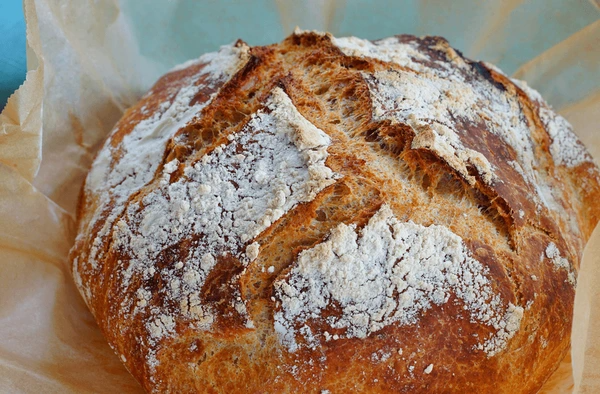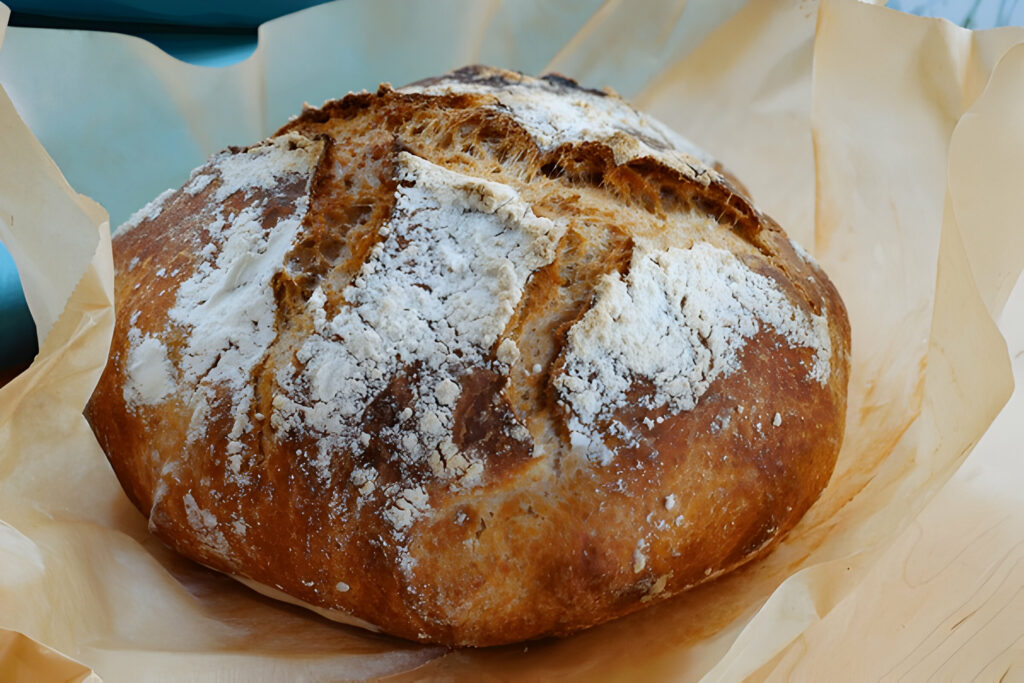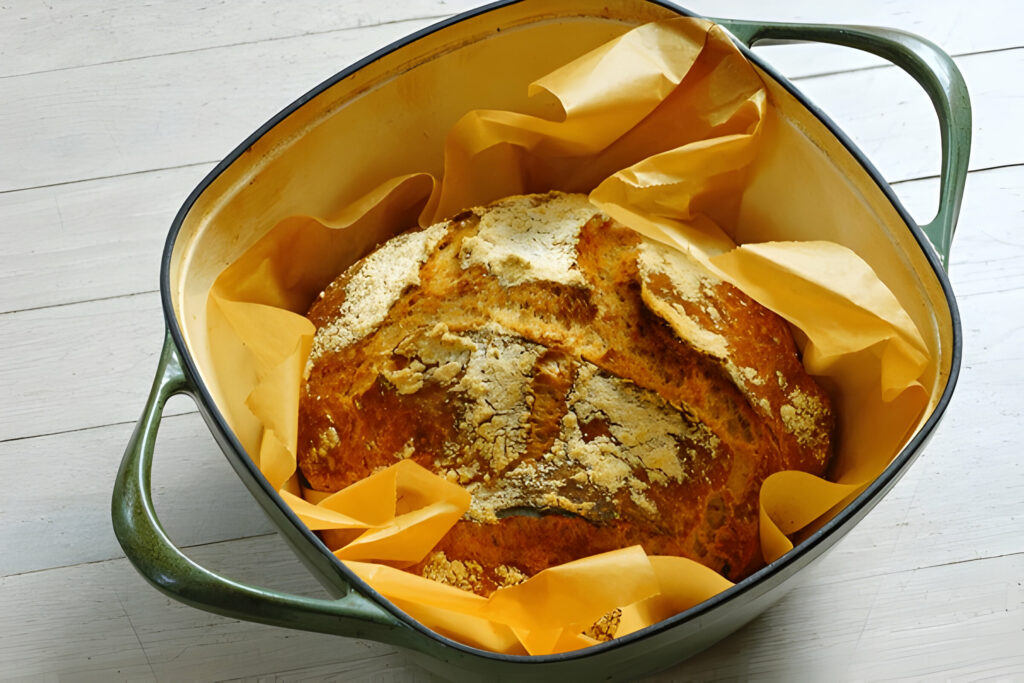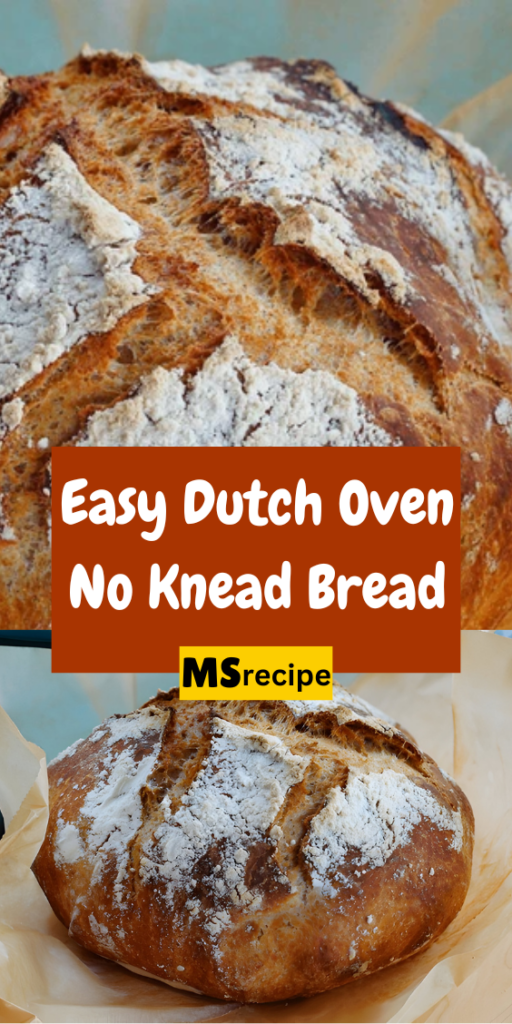EASY DUTCH OVEN NO KNEAD BREAD recipe
There’s something undeniably comforting about the aroma of freshly baked bread wafting through the kitchen.

This Dutch Oven No Knead Crusty Bread recipe is the perfect answer for anyone longing for that homey feel without the fuss.
With just 5 minutes of prep, this recipe transforms basic pantry ingredients into a beautifully golden, crusty loaf. The best part? No kneading is required, and it’s all done in under 3 hours!
Perfect for beginners and seasoned bakers alike, this method relies on a simple mix-and-rest technique, allowing the dough to develop flavor and texture naturally.
The secret to achieving that irresistibly crunchy crust lies in baking it in a Dutch oven, which traps steam and creates a perfect environment for the dough to rise and bake to golden perfection. Whether you’re serving it as a side for soups and stews, or simply enjoying a slice with butter, this bread is sure to be a hit!
From its crispy exterior to the soft, chewy interior, this Dutch Oven No Knead Crusty Bread brings artisan-quality bread right to your home kitchen. With only a few simple steps, you’ll be amazed at how easy it is to create a bakery-worthy loaf with minimal effort. Ready to bake? Let’s dive into the ingredients!
Key Ingredients for Dutch Oven No Knead Crusty Bread
Warm Water – Essential for activating the yeast and hydrating the flour, which is crucial for dough formation.
Yeast (Active Dry, Instant, or Quick Rise) – This is the magic ingredient that helps the bread rise and gives it a delightful airy texture.
Fine Grain Salt – Enhances the flavor of the bread while controlling the yeast’s activity to ensure a proper rise.
All-Purpose Flour or Bread Flour – The main structure of the bread, providing the necessary proteins and starches for a beautiful crumb. Choose King Arthur or another quality brand for the best results.

Simple Steps to Your Perfect Crusty Bread
In a large bowl, combine the warm water, yeast, and salt until the yeast is mostly dissolved. Quickly mix in the flour until a sticky dough forms.
Cover the bowl with a kitchen towel and let it rise in a warm spot for 2-3 hours until it doubles in size.
Preheat your oven to 450°F, placing the Dutch oven inside with the lid on while preheating. Let it heat for an additional 20 minutes after the oven reaches the desired temperature.
Shape the dough on a floured piece of parchment paper, then carefully transfer it into the preheated Dutch oven using the parchment paper as a sling.
Bake with the lid on for 35 minutes (or 40 minutes if the dough is cold), then remove the lid and bake for an additional 5-10 minutes until the crust is golden brown.
Cool on a wire rack for at least 10 minutes before slicing and serving.
Handy Tips for Your Baking Adventure
Adjusting Dough Consistency: If your dough seems too wet or dry, adjust by adding 1-2 tablespoons of flour or water as needed until the consistency matches a sticky, shaggy texture.
Experiment with Add-Ins: Enhance your bread by adding herbs, garlic, cheese, or other ingredients before the dough rises.
Crispier Crust: For an even crustier loaf, consider adding a pan of water to the bottom of the oven to create steam.
Storing Leftovers for Freshness
To keep your Dutch Oven No Knead Crusty Bread fresh, store it at room temperature in a bread bag or wrapped in a clean kitchen towel for up to 2 days.
For longer storage, freeze sliced bread in a zip-top bag, squeezing out as much air as possible. When you’re ready to enjoy, thaw at room temperature or warm slices in the oven for a few minutes to revive the crust.


EASY DUTCH OVEN NO KNEAD BREAD RECIPE
Equipment
- Dutch Oven
- Silicone Spatula
- Parchment paper
- Meat Thermometer (for checking water temperature)
Ingredients
- 3 1/4 cups all-purpose flour or bread flour plus extra for dusting; adjust as needed for consistency
- 1 1/2 cups warm water around 100°F
- 1 packet active dry instant, or quick-rise yeast (2.25 teaspoons)
- 1/2 tablespoon fine grain salt preferably non-iodized
Instructions
- In a large mixing bowl, combine the warm water, yeast, and salt. Stir with a whisk until the yeast and salt are mostly dissolved.
- Add the flour to the bowl all at once. Stir with a spatula until a sticky dough forms. Do not overmix; just ensure all ingredients are incorporated and the dough is uniformly wet.
- Cover the bowl with a kitchen towel or loosely with a lid, and allow the dough to rise in a warm place for 2-3 hours, or until it has doubled in size.
- Preheat the oven to 450°F about 30-60 minutes before baking. Place your Dutch oven (with the lid on) inside the oven while preheating to get it hot.
- Transfer the dough onto a piece of parchment paper dusted with flour, shaping it into a loaf by folding the edges up with a spatula.
- Flip the loaf over using the parchment paper, positioning it so that the floured side is on top.
- Optional: Make a few shallow cuts on the top of the loaf with a sharp knife or razor blade.
- Carefully remove the preheated Dutch oven, place the parchment paper with the dough inside, cover with the lid, and bake for 35 minutes (or 40 minutes if the dough was refrigerated).
- Remove the lid and bake for an additional 5-10 minutes, or until the crust turns golden brown.
- Remove the bread from the Dutch oven by lifting the parchment paper and let it cool on a wire rack for at least 10 minutes (preferably 30 minutes to 1 hour) before slicing.
Notes
FAQ
Can I bake two smaller loaves at once in the Dutch oven?
It’s best to bake them separately as they will expand during baking, potentially affecting the shape and texture.
Is parchment paper necessary for baking?
Parchment paper is recommended but not essential. Alternatives like dusting with cornmeal can prevent sticking, but be cautious when handling a hot Dutch oven.
Is it okay to not let the yeast proof for this bread recipe?
Yes, this recipe skips the traditional yeast proofing, which is a common method in no-knead bread recipes. The dough still rises well without this step.
Why is my bread turning out too dense?
Density can result from over or under-proofing, overhandling the dough, or the nature of no-knead bread. Adjust proofing time and handling to improve results.
Why is the bottom of my bread too hard?
Try using parchment paper or switching to an enameled Dutch oven to help reduce bottom crust hardness.
Can I make this bread gluten-free?
Though not personally tested by the author, readers have reported success with gluten-free flour. Be sure to experiment with different brands and ratios for the best outcome.

